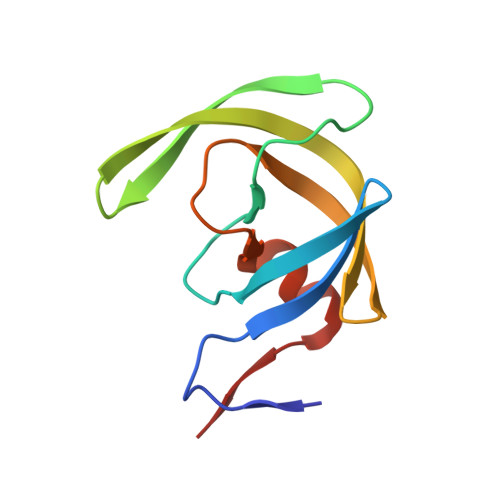Amprenavir complexes with HIV-1 protease and its drug-resistant mutants altering hydrophobic clusters.
Shen, C.H., Wang, Y.F., Kovalevsky, A.Y., Harrison, R.W., Weber, I.T.(2010) FEBS J 277: 3699-3714
- PubMed: 20695887
- DOI: https://doi.org/10.1111/j.1742-4658.2010.07771.x
- Primary Citation of Related Structures:
3NU3, 3NU4, 3NU5, 3NU6, 3NU9, 3NUJ, 3NUO - PubMed Abstract:
The structural and kinetic effects of amprenavir (APV), a clinical HIV protease (PR) inhibitor, were analyzed with wild-type enzyme and mutants with single substitutions of V32I, I50V, I54V, I54M, I84V and L90M that are common in drug resistance. Crystal structures of the APV complexes at resolutions of 1.02-1.85 Å reveal the structural changes due to the mutations. Substitution of the larger side chains in PR(V32I) , PR(I54M) and PR(L90M) resulted in the formation of new hydrophobic contacts with flap residues, residues 79 and 80, and Asp25, respectively. Mutation to smaller side chains eliminated hydrophobic interactions in the PR(I50V) and PR(I54V) structures. The PR(I84V)-APV complex had lost hydrophobic contacts with APV, the PR(V32I)-APV complex showed increased hydrophobic contacts within the hydrophobic cluster and the PR(I50V) complex had weaker polar and hydrophobic interactions with APV. The observed structural changes in PR(I84V)-APV, PR(V32I)-APV and PR(I50V)-APV were related to their reduced inhibition by APV of six-, 10- and 30-fold, respectively, relative to wild-type PR. The APV complexes were compared with the corresponding saquinavir complexes. The PR dimers had distinct rearrangements of the flaps and 80's loops that adapt to the different P1' groups of the inhibitors, while maintaining contacts within the hydrophobic cluster. These small changes in the loops and weak internal interactions produce the different patterns of resistant mutations for the two drugs.
- Department of Biology, Molecular Basis of Disease Program, Georgia State University, Atlanta, GA, USA.
Organizational Affiliation:



















